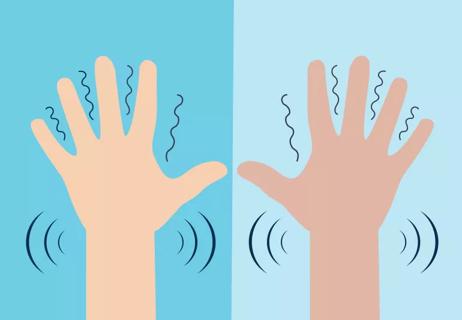Managing life's stresses help treatments work

Managing stressful feelings and situations is a life skill for all of us, but it’s especially important if you struggle with essential tremor. While medication and lifestyle changes can help control symptoms, stress, in particular, can easily aggravate the condition.
Advertisement
Cleveland Clinic is a non-profit academic medical center. Advertising on our site helps support our mission. We do not endorse non-Cleveland Clinic products or services. Policy
At first, essential tremor can resemble Parkinson’s disease. However, you can tell the two conditions apart because essential tremor generally kicks in while your hands are in motion — eating, drinking or writing.
“On the other hand, there is a tendency for tremors from Parkinson’s to affect you when you’re still,” says neurologist Kristin Appleby, MD. “It’s important to note that people with essential tremor also can have tremors when their hands are at rest. Some people with Parkinson’s disease don’t have tremor, so it is important to see a neurologist for diagnosis.”
Tremors generally affect people’s hands, but occasionally they affect their head, jaw or voice. A small number of people who struggle with essential tremor can have balance problems.
While essential tremor can run in families, many people have no family history of tremors.
“Medications for other conditions, such as lithium or antidepressants, may also contribute to tremors,” says Dr. Appleby. “Hyperthyroidism can also cause tremors that mimic essential tremor.”
People most often will first notice symptoms either in their 20s – or not until later in their 60s. Your neurologist will recommend lifestyle changes and medications to best address your essential tremor.
Advertisement
For any of these solutions to work, you must reduce stress, including the stress the tremors themselves cause.
“People don’t want to go to restaurants because they’re embarrassed,” says Dr. Appleby. “Anytime anyone is angry, stressed out or embarrassed, it can make the tremor worse, which increases their stress level. It just snowballs.”
Dr. Appleby recommends finding an activity that helps you de-stress and practice it frequently. Try yoga, going for walks, being in nature or winding down by reading a book.
While completely avoiding stress is impossible, it’s important to take steps to try to decrease it. Reducing stress lowers the impact that tremors have on your life.
Beyond reducing stress, your neurologist will try different medications — most often propranolol, a blood pressure medication, or primidone, an anti-seizure drug.
“They’re about equally likely to work in the general population,” she says. “However, propranolol can cause or exacerbate low blood pressure causing dizziness, while primidone can make people very tired or feel off balance.”
Talk to your neurologist about your medical history so they can recommend the best medication for you.
Besides medication, you should also should choose the tasks you plan to do thoughtfully, as well as the timing for these tasks. The National Institutes of Health recommends:
Your doctor may recommend implanting a deep brain stimulator (or DBS) if medications don’t work or aren’t tolerated well.
Advertisement
“DBS is brain surgery, but the incision sites on the head are smaller than a quarter,” says Dr. Appleby. “It helps the vast majority of people with essential tremor.”
During the procedure, your surgeon will implant a device that delivers electrical stimulation to the part of the brain that is partly responsible for the tremors, which can calm them. It’s like a pacemaker for the brain.
Another option to treat essential tremor is an MR-guided focused ultrasound. This procedure consists of focusing 1,000 beams of ultrasound on a specific area of the brain that relays motor and sensory signals. Talk to your doctor about if this procedure is right for you.
Being realistic is important when it comes to surgery or any other essential tremor treatment.
“Having the tremor stop entirely is not a realistic expectation, though it does sometimes happen,” she says. “We can usually get the tremors very well-controlled, but we’re not striving for perfection. The true goal is for people accomplish whatever they need to do, with as little tremor as possible.”
Advertisement
Learn more about our editorial process.
Advertisement

What to watch for and when to seek help

These neurological conditions affect muscle movement in separate ways

Stretching, water-based activities, cycling and treadmill training can all bring benefits

Securing your home, preparing your neighbors and teaching your loved one to swim are key to ensuring your child’s safety

Between 50% and 70% of autistic people also have an attention-deficit/hyperactivity disorder diagnosis

Describing people as ‘high- or low-functioning’ is both medically inaccurate and dehumanizing

Differences in symptom presentation may lead to women and girls being underdiagnosed

A variety of healthy foods can help reduce inflammation and keep other conditions at bay

If you’re feeling short of breath, sleep can be tough — propping yourself up or sleeping on your side may help

If you fear the unknown or find yourself needing reassurance often, you may identify with this attachment style

If you’re looking to boost your gut health, it’s better to get fiber from whole foods